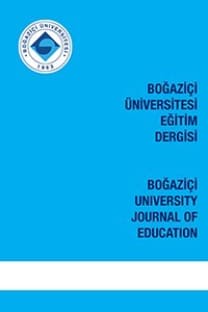Yükseköğretimdeki Uzaktan Eğitimde Gelişen Yeni Öğrenci ve Öğretim Elemanı Rolleri
2020 yılında yükseköğretim kurumlarında uzaktan eğitime yapılan hızlı geçiş hem öğrenciler hem de öğretim elemanlarının eğitim-öğretim hayatlarında kesintiye sebep olmuştur. Bu çalışma küresel olarak yaşanan bu zorluğun içinden, öğretim elemanları ve öğrencilerin yeni ve dönüştürücü roller kazanmaları için çıkmış olabilecek fırsatları değerlendirmektedir. Çalışmanın verisi Türkiye, İstanbul’daki bir üniversitenin İngiliz edebiyatı bölümündeki 112 öğrenciye ve 9 öğretim elemanına uygulanan anket ve aynı gruplardan yarı-yapılandırılmış görüşmelere gönüllü olarak katılan kişilerden toplanmıştır. Çalışmanın bulguları uzaktan eğitimde öğrencilerin öğrenim süreçlerinin daha etkin ve öz-yönlendirmeli bir yapıda ve öğretim elemanlarının ise verdikleri eğitimin yeni roller ve stratejiler geliştirmeleri sonucunda daha yaratıcı ve yol gösterici bir yapıda gerçekleştiğini ortaya koymuştur. Çalışmanın sonuçları yaşanan bu deneyimi derinlemesine anlamayı ve uzaktan eğitimde kullanılan uygulamalarının uygulanabilirliğini ve etkilerini tartışmayı sağlamıştır.
Anahtar Kelimeler:
Uzaktan Eğitim, Üniversite öğrencileri, Öğretim elemanları, Yükseköğretim
Developing New Student and Instructor Roles in Online/Distance Higher Education
The enforced rapid transition to online/distance education in 2020 created immeasurable disruption both for the faculty and students in HE contexts. The present study discusses whether an opportunity is born out of a globally experienced challenge for university instructors and students to develop new and transformative roles. The data for the present study were collected during the third term of distance education through a survey conducted with 112 students and 9 faculty members and semi-structured interviews with a convenient sampling of students and faculty members of an English department in Istanbul, Turkey. The findings indicated that online education enabled students to become more active and self-directed learners and faculty members to develop newer roles and strategies as course designers and mentors. The findings revealed an in-depth understanding of the experience and yielded implications for the viability of applications of distance/online/blended modes of learning and teaching.
Keywords:
Online education, Students, Faculty Members, Higher education,
___
- Ali, W. (2020). Online and remote learning in higher education institutes: A necessity in light of COVID-19 pandemic. Higher Education Studies, 10(3). https://doi.org/10.5539/hes.v10n3p16.
- Aristovnik, A., Keržič, D., Ravšelj, D., Tomaževič, N., & Umek, L. (2020). Impacts of the COVID-19 pandemic on life of higher education students: A global perspective. Sustainability, 12(20), 1–34. https://doi.org/10.3390/su12208438.
- Bao W. (2020). COVID-19 and online teaching in higher education: A case study of Peking University. Human Behavior and Emerging Technologies, 2(2), 113–115. https://doi.org/10.1002/hbe2.191.
- Cranfield, D., Tick, A., Venter, I. M., Blignaut, R.J. & Renaud, K. (2021). Higher education students’ perceptions of online learning during COVID-19—A comparative study. Education Sciences, 11, 403. https://doi.org/10.3390/educsci11080403.
- Creswell, J.W. (2013). Research design: Qualitative, quantitative, and mixed method approaches. SAGE Publications
- Dörnyei, Z. (2003). Questionnaires in second language research: Construction, administration and processing. Lawrence, Erlbaum Associates.
- Geng, S., Law, K.M.Y. & Niu, B. (2019). Investigating self-directed learning and technology readiness in blending learning environment. International Journal of Educational Technology in Higher Education, 16(1), 1-22. https://doi.org/10.1186/s41239-019-0147-0
- Henderson, M., Selwyn, N. & Aston, R. (2017). What works and why? Student perceptions of ‘useful’ digital technology in university teaching and learning, Studies in Higher Education, 42(8), 1567-1579. https://doi.org/10.1080/03075079.2015.1007946.
- Hodges, C., Moore, S., Lockee, B., Trust, T., & Bond, A. (2020). The difference between emergency remote teaching and online learning. Educause Review, (March 27, 2020). https://er.educause.edu/articles/2020/3/the-difference-between-emergency-remote-teaching-and-online-learning.
- Ivankova, N.V., & Creswell, J.W. (2009). Mixed methods. In J. Heigham ve R. A. Croker (Eds.), Qualitative research in applied linguistics: A practical introduction (pp. 135-161). Palgrave Macmillan.
- Marek, M.W., Chew, C.S., & Wu, W.V. (2021). Teacher experiences in converting classes to distance learning in the COVID-19 pandemic. International Journal of Distance Education Technologies, 19(1). https://doi.org/10.4018/IJDET.20210101.oa3
- Mishra, L., Gupta, T. & Shree, A. (2020). Online teaching-learning in higher education during lockdown period of COVID-19 pandemic. International Journal of Educational Research Open, 1. https://doi.org/10.1016/j.ijedro.2020.100012.
- Oyedotun, T. D. (2020). Sudden change of pedagogy in education driven by COVID-19: Perspectives and evaluation from a developing country. Research in Globalization, 2. https://doi.org/10.1016/j.resglo.2020.100029
- Paudel, P. (2021). Online education: Benefits, challenges and strategies during and after COVID-19 in higher education. International Journal on Studies in Education, 3(2), 70-85. https://doi.org/10.46328/ijonse.32.
- Peimani, N. & Kamalipour, H. (2021). Online education in the post COVID-19 era: Students’ perception and learning experience. Education Sciences. 11(10), 633. https://doi.org/10.3390/educsci11100633.
- Prensky, M. (2001). Digital natives, digital immigrants. On the Horizon, 9(5), 1–6.
- Strielkowski, W. (2020). COVID-19 pandemic and the digital revolution in academia and higher education. Preprints. https://doi.org/10.20944/preprints202004.0290.v1
- Thorne, S., Sauro, S., & Smith, B. (2015). Technologies, identities, and expressive activity. Annual Review of Applied Linguistics, 35, 215-233. https://doi.org/10.1017/S0267190514000257.
- Tsang, J.T.Y., So, M.K.P., Chong, A.C.Y., Lam, B.S.Y., & Chu, A.M.Y. (2021). Higher education during the pandemic: The predictive factors of learning effectiveness in COVID-19 online learning. Education Sciences, 11(8), 446. https://doi.org/10.3390/educsci11080446.
- UNESCO (2020). Education: From disruption to recovery. UNESCO Institute for Statistics Data. https://en.unesco.org/covid19/educationresponse
- Ünaldı, İ., Kaçmaz, E., & Baykara, T. (2021). Üniversite öğrencilerinin çevrim içi eğitimle ilgili görüşleri. Kocaeli Üniversitesi Eğitim Dergisi, 4(2), 274-294. http://doi.org/10.33400/kuje.951263
- ISSN: 1300-9567
- Yayın Aralığı: Yılda 2 Sayı
- Başlangıç: 1976
- Yayıncı: Boğaziçi Üniversitesi
Sayıdaki Diğer Makaleler
Öğretmenlerin ve Öğrencilerin Odi Zihin Halini Geliştirmek: ENRICH Projesinin İlkeleri ve Önermeleri
Yükseköğretimdeki Uzaktan Eğitimde Gelişen Yeni Öğrenci ve Öğretim Elemanı Rolleri
Paraskevi THOMOU, Christina TEGOU, Thomais ROUSOULİOTİ
Korku, Çaresizlik, Sevgi, Nefret, Huzur: Duygusal Covid-19 Gelgitleri
Bengu BORKAN, Engin ADER, Beyza İNCEÇAM, Arif BÖYÜKSOLAK, Emine ERKTİN, Güneş ERTAŞ, Serkan ARIKAN
Kırsal-Kent Başarı Farkını Açıklayan Öğrenci ve Okul Özellikleri: TIMSS 2019 Analizi
Safiye BİLİCAN DEMİR, Özen YILDIRIM
Dil Öğretmenlerinin Çokdilli Sınıflara Yaklaşımları: Dilsel İdeolojik Bir Perspektif
